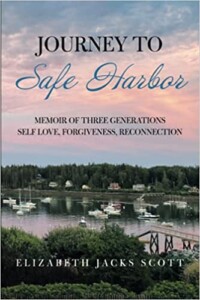Title: Journey to Safe Harbor
Author: Elizabeth Jacks Scott
Publisher: XlibrisUS
ISBN: 1664172815
Genre: Biography & Autobiography
Pages: 290
Reviewed by: David Allen
Pacific Book Review
 The life narratives of author Elizabeth Jacks Scott and her family span many decades, several continents, and several epochs in American and world history. The author is a skillful and ever curious historian who follows the fascinating and complex mosaic of her forebears and siblings in Tenants Harbor, Maine; in India; in Wolfville, Nova Scotia; and in Chicago.
The life narratives of author Elizabeth Jacks Scott and her family span many decades, several continents, and several epochs in American and world history. The author is a skillful and ever curious historian who follows the fascinating and complex mosaic of her forebears and siblings in Tenants Harbor, Maine; in India; in Wolfville, Nova Scotia; and in Chicago.
Her grandmother Clara’s sail loft home in Maine serves as the anchor point for the interwoven and intergenerational exploits of the family. Following more than two decades of Baptist missionary service in Vizagapatam, India, with her husband Hebron,
Clara returns to Maine to live out her years. Elizabeth Jacks Scott, a formidable detective, estimable granddaughter and excellent writer, traces out and ties together the threads of the family’s astonishing story. Ms. Scott, a grief counselor and ordained minister, lives with her husband in New York City, the Hudson Valley, and the coast of Maine. They have four children and eight grandchildren.
The book is a personal story as well as a historical and cultural one. Welcome to turn of the (19th century) India, in the throes of colonial rule and sometimes well-intentioned but often misguided missionary zeal, where infant native girls are tossed out to die in the street. Cholera, poverty and a cruel and outmoded but extant caste system rule. The missionaries’ work is cut out for them. The author’s acerbic commentary, dipping into psychologic insight and rueful personal reflection, frames her super articulate and always engaging voice.
Reflecting on her childhood in a racially divided neighborhood in Chicago, Scott can’t help but notice a parallel in the colonial India of her grandparents. She writes, ” Children in a family for whom the needs of strangers in the community take precedence over their own needs often react by becoming deeply depressed…” and “the theology that emphasizes life after death is often the theology of a stricken people. The excruciating tragedy of their current life was made bearable by the hope of happiness in the next life.” It is safe to assume that this comment applied equally well to the missionaries abroad.
This is the universe of the White Man’s Burden, of Rudyard Kipling’s Jungle Book. It is also the privileged but riven world of the White Anglo-Saxon Protestant, whose self- righteous and repressive ardor exact a heavy toll on its issue. Author Scott, to her greater credit, makes her credible observations but does not rush to judgment. Some of the many virtues of Journey to Safe Harbor is its intelligent pacing and world class writing.


